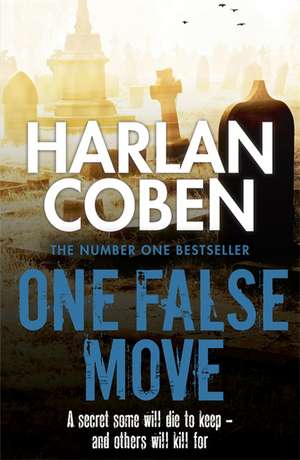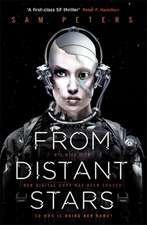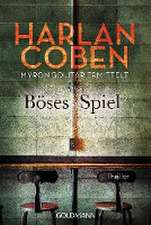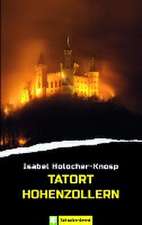One False Move
Autor Harlan Cobenen Limba Engleză Paperback – 24 apr 2014
| Toate formatele și edițiile | Preț | Express |
|---|---|---|
| Paperback (2) | 49.30 lei 3-5 săpt. | +25.73 lei 5-11 zile |
| Orion Publishing Group – 24 apr 2014 | 49.30 lei 3-5 săpt. | +25.73 lei 5-11 zile |
| Dell Publishing Company – 31 iul 2009 | 57.49 lei 3-5 săpt. |
Preț: 49.30 lei
Preț vechi: 64.04 lei
-23% Nou
Puncte Express: 74
Preț estimativ în valută:
9.43€ • 9.81$ • 7.79£
9.43€ • 9.81$ • 7.79£
Carte disponibilă
Livrare economică 24 martie-07 aprilie
Livrare express 08-14 martie pentru 35.72 lei
Preluare comenzi: 021 569.72.76
Specificații
ISBN-13: 9781409150534
ISBN-10: 1409150534
Pagini: 368
Dimensiuni: 198 x 130 x 26 mm
Greutate: 0.27 kg
Editura: Orion Publishing Group
ISBN-10: 1409150534
Pagini: 368
Dimensiuni: 198 x 130 x 26 mm
Greutate: 0.27 kg
Editura: Orion Publishing Group
Notă biografică
Harlan Coben is the winner of the Edgar, Shamus, and Anthony awards. His critically acclaimed novels have been published in thirty-three languages around the world and have been number one bestsellers in more than half a dozen countries. In addition to the Myron Bolitar series (Deal Breaker, Drop Shot, Fade Away, Back Spin, One False Move, The Final Detail, Darkest Fear, and the upcoming Promise Me), he is also the author of Tell No One, Gone for Good, No Second Chance, Just One Look, and The Innocent.
Extras
An hour before his world exploded like a ripe tomato under a stiletto heel, Myron bit into a fresh pastry that tasted suspiciously like a urinal cake.
"Well?" Mom prompted.
Myron battled his throat, won a costly victory, swallowed. "Not bad."
Mom shook her head, disappointed.
"What?"
"I'm a lawyer," Mom said. "You'd think I'd have raised a better liar."
"You did the best you could," Myron said.
She shrugged and waved a hand at the, uh, pastry. "It's my first time baking, bubbe. It's okay to tell me the truth."
"It's like biting into a urinal cake," Myron said.
"A what?"
"In men's public bathrooms. In the urinals. They put them there for the smell or something."
"And you eat them?"
"No--"
"Is that why your father takes so long in there? He's having a little Tastykake? And here I thought his prostate was acting up."
"I'm joking, Mom."
She smiled through blue eyes tinged with a red that Visine could never hope to get out, the red you can only get through slow, steady tears. Normally Mom was heavily into histrionics. Slow, steady tears were not her style. "So am I, Mr. Smarty Pants. You think you're the only one in this family with a sense of humor?"
Myron said nothing. He looked down at the, uh, pastry, fearing or perhaps hoping it might crawl away. In the thirty-plus years his mother had lived in this house, she had never baked -- not from a recipe, not from scratch, not even from one of those Pillsbury morning croissant thingies that came in small mailing tubes. She could barely boil water without strict instructions and pretty much never cooked, though she could whip up a mean Celeste frozen pizza in the microwave, her agile fingers dancing across the numerical keypad in the vein of Nureyev at Lincoln Center. No, in the Bolitar household, the kitchen was more a gathering place -- a Family Room Lite, if you will -- than anything related to even the basest of the culinary arts. The round table held magazines and catalogs and congealing white boxes of Chinese takeout. The stovetop saw less action than a Merchant-Ivory production. The oven was a prop, strictly for show, like a politician's Bible.
Something was definitely amiss.
They were sitting in the living room with the dated pseudo-leather white modular couch and aqua-tinged rug whose shagginess reminded Myron of a toilet-seat cover. Grown-up Greg Brady. Myron kept stealing glances out the picture window at the For Sale sign in the front yard as though it were a spaceship that had just landed and something sinister was about to step out.
"Where's Dad?"
Mom gave a weary wave toward the door. "He's in the basement."
"In my room?"
"Your old room, yes. You moved out, remember?"
He did -- at the tender age of thirty-four no less. Childcare experts would salivate and tsk-tsk over that one -- the prodigal son choosing to remain in his split-level cocoon long after the deemed appropriate deadline for the butterfly to break free. But Myron might argue the opposite. He might bring up the fact that for generations and in most cultures, offspring lived in the familial home until a ripe old age, that adopting such a philosophy could indeed be a societal boom, helping people stay rooted to something tangible in this era of the disintegrating nuclear family. Or, if that rationale didn't float your boat, Myron could try another. He had a million.
But the truth of the matter was far simpler: He liked hanging out in the burbs with Mom and Dad -- even if confessing such a sentiment was about as hip as an Air Supply eight track.
"So what's going on?" he asked.
"Your father doesn't know you're here yet," she said. "He thinks you're not coming for another hour."
Myron nodded, puzzled. "What's he doing in the basement?"
"He bought a computer. Your father plays with it down there."
"Dad?"
"My point exactly. The man can't change a lightbulb without a manual -- all of a sudden he's Bill Gates. Always on the nest."
"The Net," Myron corrected.
"The what?"
"It's called the Net, Mom."
"I thought it was nest. The bird's nest or something."
"No, it's Net."
"Are you sure? I know there's a bird in there somewhere."
"The Web maybe," Myron tried. "Like with a spider."
She snapped her fingers. "That's it. Anyway your father is on there all the time, weaving the Web or whatever. He chats with people, Myron. That's what he tells me. He chats with complete strangers. Like he used to do with the CB radio, remember?"
Myron remembered. Circa 1976. Jewish Dads in the suburbs checking for "smokeys" on the way to the delicatessen. Mighty convoy of Cadillac Sevilles. Ten-four, good buddy.
"And that's not all," she went on. "He's typing his memoirs. A man who can't scribble down a grocery list without consulting Strunk and White suddenly thinks he's an ex-president."
They were selling the house. Myron still could not believe it. His eyes wandered about the overly familiar surroundings, his gaze getting snagged on the photographs running up the stairwell. He saw his family mature via fashion -- the skirts and sideburns lengthening and shortening, the quasi-hippie fringes and suede and tie-dyes, the leisure suits and bell-bottoms, the frilly tuxedos that would be too tacky for a Vegas casino -- the years flying by frame by frame like one of those depressing life insurance commercials. He spotted the poses from his basketball days -- a sixth-grade suburban-league foul shot, an eighth-grade drive to the hoop, a high school slam dunk -- the row ending with Sports Illustrated cover shots, two from his days at Duke and one with his leg in a cast and a large-fonted IS HE FINISHED? emblazoned across his knee-cast image (the answer in the mind's eye being an equally large-fonted YES!).
"So what's wrong?" he asked.
"I didn't say anything was wrong."
Myron shook his head, disappointed. "And you a lawyer."
"Setting a bad example?"
"It's no wonder I never ran for higher office."
She folded her hands on her lap. "We need to chat."
Myron didn't like the tone.
"But not here," she added. "Let's take a walk around the block."
Myron nodded and they rose. Before they reached the door, his cell phone rang. Myron snatched it up with a speed that would have made Wyatt Earp step back. He put the phone to his ear and cleared his throat.
"MB SportsReps," he said, silky-smooth, professional-like. "This is Myron Bolitar speaking."
"Nice phone voice," Esperanza said. "You sound like Billy Dee ordering two Colt 45s."
Esperanza Diaz was his longtime assistant and now sports-agent partner at MB SportsReps (M for Myron, the B for Bolitar -- for those keeping score).
"I was hoping you were Lamar," he said.
"He hasn't called yet?"
"Nope."
He could almost see Esperanza frown. "We're in deep doo-doo here," she said.
"We're not in deep doo-doo. We're just sucking a little wind, that's all."
"Sucking a little wind," Esperanza repeated. "Like Pavarotti running the Boston Marathon."
"Good one," Myron said.
"Thanks."
Lamar Richardson was a power-hitting Golden Glove shortstop who'd just become a free agent -- "free agent" being a phrase agents whisper in the same way a mufti might whisper "Praise Allah." Lamar was shopping for new representation and had whittled his final list down to three agencies: two supersized conglomerates with enough office space to house a Price Club and the aforementioned pimple-on-the-buttocks but oh-so-personal MB SportsReps. Go, pimple-butt!
Myron watched his mother standing by the door. He switched ears and said, "Anything else?"
"You'll never guess who called," Esperanza said.
"Elle and Claudia demanding another menage a trois?"
"Oooo, close."
She would never just tell him. With his friends, everything was a TV game show. "How about a hint?" he said.
"One of your ex-lovers."
He felt a jolt. "Jessica."
Esperanza made a buzzing noise. "Sorry, wrong bitch."
Myron was puzzled. He'd only had two long-term relationships in his life: Jessica on and off for the past thirteen years (now very off). And before that, well, you'd have to go back to...
"Emily Downing?"
Esperanza made a ding-ding noise.
A sudden image pierced his heart like a straight-blade. He saw Emily sitting on that threadbare couch in the frat basement, smiling that smile at him, her legs bent and tucked under her, wearing his high school varsity jacket that was several sizes too big, her gesturing hands slipping down and disappearing into the sleeves.
His mouth went dry. "What did she want?"
"Don't know. But she said that she simply had to talk to you. She's very breathy, you know. Like everything she says is a double entendre."
With Emily, everything was.
"She good in the sack?" Esperanza asked.
Being an overly attractive bisexual, Esperanza viewed everyone as a potential sex partner. Myron wondered what that must be like, to have and thus weigh so many options, and then he decided to leave that road untraveled. Wise man.
"What did Emily say exactly?" Myron said.
"Nothing specific. She just spewed out a colorful assortment of breathy teasers: urgent, life-and-death, grave matters, etceteras, etceteras."
"I don't want to talk to her."
"I didn't think so. If she calls back, you want me to give her the runaround?"
"Please."
"Mas tarde then."
He hung up as a second image whacked him like a surprise wave at the beach. Senior year at Duke. Emily so composed as she dumped the varsity jacket onto his bed and walked out. Not long after that, she married the man who'd ruin Myron's life.
Deep breaths, he told himself. In and out. That's it.
"Everything okay?" Mom asked.
"Fine."
Mom shook her head again, disappointed.
"I'm not lying," he said.
"Fine, right, sure, you always breathe like an obscene phone call. Listen, if you don't want to tell your mother--"
"I don't want to tell my mother."
"Who raised you and..."
Myron tuned her out, as was his custom. She was digressing again, taking on a past life or something. It was something she did a lot. One minute she was thoroughly modern, an early feminist who marched alongside Gloria Steinem and became proof that -- to quote her old T-shirt -- A Woman's Place Is in the House ... and Senate. But at the sight of her son, her progressive attire slid to the floor and revealed the babushka-clad yenta beneath the burned bra. It made for an interesting childhood.
They headed out the front door. Myron kept his eyes on the For Sale sign as though it might suddenly brandish a gun. His mind flashed onto something he had never actually seen -- the sunny day when Mom and Dad had arrived here for the first time, hand in hand, Mom's belly swelling with child, both of them scared and exhilarated realizing that this cookie-cut three-bedroom split-level would be their life vessel, their SS American Dream. Now, like it or not, that journey was coming to an end. Forget that "close one door, open another" crap. That For Sale sign marked the end -- the end of youth, of middle age, of a family, the universe of two people who'd started here and fought here and raised kids here and worked and carpooled and lived their lives here.
They walked up the street. Leaves were piled along the curb, the surest sign of suburban autumn, while leaf blowers shattered the still air like helicopters over Saigon. Myron took the inside track so his path would skim the piles' edges. The dead leaves crackled under his sneakers and he liked that. He wasn't sure why.
"Your father spoke to you," Mom said, half-question. "About what happened to him."
Myron felt his stomach tense up. He veered deeper into the leaves, lifting his legs high and crunching louder. "Yes."
"What did he say exactly?" Mom asked.
"That he'd had chest pains while I was in the Caribbean."
The Kaufman house had always been yellow, but the new family had painted it white. It looked wrong with the new color, out of place. Some homes had gone the aluminum-siding route, while others had built on additions, bumping out the kitchens and master bedrooms. The young family who'd moved into the Miller home had gotten rid of the Millers' trademark overflowing flower boxes. The new owners of the Davis place had ripped out those wonderful shrubs Bob Davis had worked on every weekend. It all reminded Myron of an invading army ripping down the flags of the conquered.
"He didn't want to tell you," Mom said. "You know your father. He still feels he has to protect you."
Myron nodded, stayed in the leaves.
Then she said, "It was more than chest pains."
Myron stopped.
"It was a full-blown coronary," she went on, not meeting his eyes. "He was in intensive care for three days." She started blinking. "The artery was almost entirely blocked."
Myron felt his throat close.
"It's changed him. I know how much you love him, but you have to accept that."
"Accept what?"
Her voice was gentle and firm. "That your father is getting older. That I'm getting older."
He thought about it. "I'm trying," he said.
"But?"
"But I see that For Sale sign--"
"Wood and bricks and nails, Myron."
"What?"
She waded through the leaves and took hold of his elbow. "Listen to me. You mope around here like we're sitting shiva, but that house is not your childhood. It isn't a part of your family. It doesn't breathe or think or care. It's just wood and bricks and nails."
"You've lived there for almost thirty-five years."
"So?"
He turned away, kept walking.
"Your father wants to be honest with you," she said, "but you're not making it any easier."
"Why? What did I do?"
She shook her head, looked up into the sky as though willing divine inspiration, continued walking. Myron stayed by her side. She snaked her arm under his elbow and leaned against him.
"You were always a terrific athlete," she said. "Not like your father. Truth be told, your father was a spaz."
"I know this," Myron said.
"Right. You know this because your father never pretended to be something he wasn't. He let you see him as human -- vulnerable even. And it had a strange effect on you. You worshipped him all the more. You turned him into something almost mythical."
Myron thought about it, didn't argue. He shrugged and said, "I love him."
"I know, sweetheart. But he's just a man. A good man. But now he's getting old and he's scared. Your father always wanted you to see him as human. But he doesn't want you to see him scared."
Myron kept his head down. There are certain things you cannot picture your parents doing -- having sex being the classic example. Most people cannot -- probably should not even try to -- picture their parents in flagrante delicto. But right now Myron was trying to conjure up another taboo image, one of his father sitting alone in the dark, hand on his chest, scared, and the sight, while achievable, was aching, unbearable. When he spoke again, his voice was thick. "So what should I do?"
"Well?" Mom prompted.
Myron battled his throat, won a costly victory, swallowed. "Not bad."
Mom shook her head, disappointed.
"What?"
"I'm a lawyer," Mom said. "You'd think I'd have raised a better liar."
"You did the best you could," Myron said.
She shrugged and waved a hand at the, uh, pastry. "It's my first time baking, bubbe. It's okay to tell me the truth."
"It's like biting into a urinal cake," Myron said.
"A what?"
"In men's public bathrooms. In the urinals. They put them there for the smell or something."
"And you eat them?"
"No--"
"Is that why your father takes so long in there? He's having a little Tastykake? And here I thought his prostate was acting up."
"I'm joking, Mom."
She smiled through blue eyes tinged with a red that Visine could never hope to get out, the red you can only get through slow, steady tears. Normally Mom was heavily into histrionics. Slow, steady tears were not her style. "So am I, Mr. Smarty Pants. You think you're the only one in this family with a sense of humor?"
Myron said nothing. He looked down at the, uh, pastry, fearing or perhaps hoping it might crawl away. In the thirty-plus years his mother had lived in this house, she had never baked -- not from a recipe, not from scratch, not even from one of those Pillsbury morning croissant thingies that came in small mailing tubes. She could barely boil water without strict instructions and pretty much never cooked, though she could whip up a mean Celeste frozen pizza in the microwave, her agile fingers dancing across the numerical keypad in the vein of Nureyev at Lincoln Center. No, in the Bolitar household, the kitchen was more a gathering place -- a Family Room Lite, if you will -- than anything related to even the basest of the culinary arts. The round table held magazines and catalogs and congealing white boxes of Chinese takeout. The stovetop saw less action than a Merchant-Ivory production. The oven was a prop, strictly for show, like a politician's Bible.
Something was definitely amiss.
They were sitting in the living room with the dated pseudo-leather white modular couch and aqua-tinged rug whose shagginess reminded Myron of a toilet-seat cover. Grown-up Greg Brady. Myron kept stealing glances out the picture window at the For Sale sign in the front yard as though it were a spaceship that had just landed and something sinister was about to step out.
"Where's Dad?"
Mom gave a weary wave toward the door. "He's in the basement."
"In my room?"
"Your old room, yes. You moved out, remember?"
He did -- at the tender age of thirty-four no less. Childcare experts would salivate and tsk-tsk over that one -- the prodigal son choosing to remain in his split-level cocoon long after the deemed appropriate deadline for the butterfly to break free. But Myron might argue the opposite. He might bring up the fact that for generations and in most cultures, offspring lived in the familial home until a ripe old age, that adopting such a philosophy could indeed be a societal boom, helping people stay rooted to something tangible in this era of the disintegrating nuclear family. Or, if that rationale didn't float your boat, Myron could try another. He had a million.
But the truth of the matter was far simpler: He liked hanging out in the burbs with Mom and Dad -- even if confessing such a sentiment was about as hip as an Air Supply eight track.
"So what's going on?" he asked.
"Your father doesn't know you're here yet," she said. "He thinks you're not coming for another hour."
Myron nodded, puzzled. "What's he doing in the basement?"
"He bought a computer. Your father plays with it down there."
"Dad?"
"My point exactly. The man can't change a lightbulb without a manual -- all of a sudden he's Bill Gates. Always on the nest."
"The Net," Myron corrected.
"The what?"
"It's called the Net, Mom."
"I thought it was nest. The bird's nest or something."
"No, it's Net."
"Are you sure? I know there's a bird in there somewhere."
"The Web maybe," Myron tried. "Like with a spider."
She snapped her fingers. "That's it. Anyway your father is on there all the time, weaving the Web or whatever. He chats with people, Myron. That's what he tells me. He chats with complete strangers. Like he used to do with the CB radio, remember?"
Myron remembered. Circa 1976. Jewish Dads in the suburbs checking for "smokeys" on the way to the delicatessen. Mighty convoy of Cadillac Sevilles. Ten-four, good buddy.
"And that's not all," she went on. "He's typing his memoirs. A man who can't scribble down a grocery list without consulting Strunk and White suddenly thinks he's an ex-president."
They were selling the house. Myron still could not believe it. His eyes wandered about the overly familiar surroundings, his gaze getting snagged on the photographs running up the stairwell. He saw his family mature via fashion -- the skirts and sideburns lengthening and shortening, the quasi-hippie fringes and suede and tie-dyes, the leisure suits and bell-bottoms, the frilly tuxedos that would be too tacky for a Vegas casino -- the years flying by frame by frame like one of those depressing life insurance commercials. He spotted the poses from his basketball days -- a sixth-grade suburban-league foul shot, an eighth-grade drive to the hoop, a high school slam dunk -- the row ending with Sports Illustrated cover shots, two from his days at Duke and one with his leg in a cast and a large-fonted IS HE FINISHED? emblazoned across his knee-cast image (the answer in the mind's eye being an equally large-fonted YES!).
"So what's wrong?" he asked.
"I didn't say anything was wrong."
Myron shook his head, disappointed. "And you a lawyer."
"Setting a bad example?"
"It's no wonder I never ran for higher office."
She folded her hands on her lap. "We need to chat."
Myron didn't like the tone.
"But not here," she added. "Let's take a walk around the block."
Myron nodded and they rose. Before they reached the door, his cell phone rang. Myron snatched it up with a speed that would have made Wyatt Earp step back. He put the phone to his ear and cleared his throat.
"MB SportsReps," he said, silky-smooth, professional-like. "This is Myron Bolitar speaking."
"Nice phone voice," Esperanza said. "You sound like Billy Dee ordering two Colt 45s."
Esperanza Diaz was his longtime assistant and now sports-agent partner at MB SportsReps (M for Myron, the B for Bolitar -- for those keeping score).
"I was hoping you were Lamar," he said.
"He hasn't called yet?"
"Nope."
He could almost see Esperanza frown. "We're in deep doo-doo here," she said.
"We're not in deep doo-doo. We're just sucking a little wind, that's all."
"Sucking a little wind," Esperanza repeated. "Like Pavarotti running the Boston Marathon."
"Good one," Myron said.
"Thanks."
Lamar Richardson was a power-hitting Golden Glove shortstop who'd just become a free agent -- "free agent" being a phrase agents whisper in the same way a mufti might whisper "Praise Allah." Lamar was shopping for new representation and had whittled his final list down to three agencies: two supersized conglomerates with enough office space to house a Price Club and the aforementioned pimple-on-the-buttocks but oh-so-personal MB SportsReps. Go, pimple-butt!
Myron watched his mother standing by the door. He switched ears and said, "Anything else?"
"You'll never guess who called," Esperanza said.
"Elle and Claudia demanding another menage a trois?"
"Oooo, close."
She would never just tell him. With his friends, everything was a TV game show. "How about a hint?" he said.
"One of your ex-lovers."
He felt a jolt. "Jessica."
Esperanza made a buzzing noise. "Sorry, wrong bitch."
Myron was puzzled. He'd only had two long-term relationships in his life: Jessica on and off for the past thirteen years (now very off). And before that, well, you'd have to go back to...
"Emily Downing?"
Esperanza made a ding-ding noise.
A sudden image pierced his heart like a straight-blade. He saw Emily sitting on that threadbare couch in the frat basement, smiling that smile at him, her legs bent and tucked under her, wearing his high school varsity jacket that was several sizes too big, her gesturing hands slipping down and disappearing into the sleeves.
His mouth went dry. "What did she want?"
"Don't know. But she said that she simply had to talk to you. She's very breathy, you know. Like everything she says is a double entendre."
With Emily, everything was.
"She good in the sack?" Esperanza asked.
Being an overly attractive bisexual, Esperanza viewed everyone as a potential sex partner. Myron wondered what that must be like, to have and thus weigh so many options, and then he decided to leave that road untraveled. Wise man.
"What did Emily say exactly?" Myron said.
"Nothing specific. She just spewed out a colorful assortment of breathy teasers: urgent, life-and-death, grave matters, etceteras, etceteras."
"I don't want to talk to her."
"I didn't think so. If she calls back, you want me to give her the runaround?"
"Please."
"Mas tarde then."
He hung up as a second image whacked him like a surprise wave at the beach. Senior year at Duke. Emily so composed as she dumped the varsity jacket onto his bed and walked out. Not long after that, she married the man who'd ruin Myron's life.
Deep breaths, he told himself. In and out. That's it.
"Everything okay?" Mom asked.
"Fine."
Mom shook her head again, disappointed.
"I'm not lying," he said.
"Fine, right, sure, you always breathe like an obscene phone call. Listen, if you don't want to tell your mother--"
"I don't want to tell my mother."
"Who raised you and..."
Myron tuned her out, as was his custom. She was digressing again, taking on a past life or something. It was something she did a lot. One minute she was thoroughly modern, an early feminist who marched alongside Gloria Steinem and became proof that -- to quote her old T-shirt -- A Woman's Place Is in the House ... and Senate. But at the sight of her son, her progressive attire slid to the floor and revealed the babushka-clad yenta beneath the burned bra. It made for an interesting childhood.
They headed out the front door. Myron kept his eyes on the For Sale sign as though it might suddenly brandish a gun. His mind flashed onto something he had never actually seen -- the sunny day when Mom and Dad had arrived here for the first time, hand in hand, Mom's belly swelling with child, both of them scared and exhilarated realizing that this cookie-cut three-bedroom split-level would be their life vessel, their SS American Dream. Now, like it or not, that journey was coming to an end. Forget that "close one door, open another" crap. That For Sale sign marked the end -- the end of youth, of middle age, of a family, the universe of two people who'd started here and fought here and raised kids here and worked and carpooled and lived their lives here.
They walked up the street. Leaves were piled along the curb, the surest sign of suburban autumn, while leaf blowers shattered the still air like helicopters over Saigon. Myron took the inside track so his path would skim the piles' edges. The dead leaves crackled under his sneakers and he liked that. He wasn't sure why.
"Your father spoke to you," Mom said, half-question. "About what happened to him."
Myron felt his stomach tense up. He veered deeper into the leaves, lifting his legs high and crunching louder. "Yes."
"What did he say exactly?" Mom asked.
"That he'd had chest pains while I was in the Caribbean."
The Kaufman house had always been yellow, but the new family had painted it white. It looked wrong with the new color, out of place. Some homes had gone the aluminum-siding route, while others had built on additions, bumping out the kitchens and master bedrooms. The young family who'd moved into the Miller home had gotten rid of the Millers' trademark overflowing flower boxes. The new owners of the Davis place had ripped out those wonderful shrubs Bob Davis had worked on every weekend. It all reminded Myron of an invading army ripping down the flags of the conquered.
"He didn't want to tell you," Mom said. "You know your father. He still feels he has to protect you."
Myron nodded, stayed in the leaves.
Then she said, "It was more than chest pains."
Myron stopped.
"It was a full-blown coronary," she went on, not meeting his eyes. "He was in intensive care for three days." She started blinking. "The artery was almost entirely blocked."
Myron felt his throat close.
"It's changed him. I know how much you love him, but you have to accept that."
"Accept what?"
Her voice was gentle and firm. "That your father is getting older. That I'm getting older."
He thought about it. "I'm trying," he said.
"But?"
"But I see that For Sale sign--"
"Wood and bricks and nails, Myron."
"What?"
She waded through the leaves and took hold of his elbow. "Listen to me. You mope around here like we're sitting shiva, but that house is not your childhood. It isn't a part of your family. It doesn't breathe or think or care. It's just wood and bricks and nails."
"You've lived there for almost thirty-five years."
"So?"
He turned away, kept walking.
"Your father wants to be honest with you," she said, "but you're not making it any easier."
"Why? What did I do?"
She shook her head, looked up into the sky as though willing divine inspiration, continued walking. Myron stayed by her side. She snaked her arm under his elbow and leaned against him.
"You were always a terrific athlete," she said. "Not like your father. Truth be told, your father was a spaz."
"I know this," Myron said.
"Right. You know this because your father never pretended to be something he wasn't. He let you see him as human -- vulnerable even. And it had a strange effect on you. You worshipped him all the more. You turned him into something almost mythical."
Myron thought about it, didn't argue. He shrugged and said, "I love him."
"I know, sweetheart. But he's just a man. A good man. But now he's getting old and he's scared. Your father always wanted you to see him as human. But he doesn't want you to see him scared."
Myron kept his head down. There are certain things you cannot picture your parents doing -- having sex being the classic example. Most people cannot -- probably should not even try to -- picture their parents in flagrante delicto. But right now Myron was trying to conjure up another taboo image, one of his father sitting alone in the dark, hand on his chest, scared, and the sight, while achievable, was aching, unbearable. When he spoke again, his voice was thick. "So what should I do?"
Recenzii
"A slam dunk ... You race to turn the pages ... both suspenseful and often surprisingly funny."—People
"Terrific."—Boston Globe
"A winner."—Orlando Sentinel
"Fast-paced ... layered with both tenderness and fun ... Coben [is] a gifted storyteller."—Denver Post
“Myron Bolitar is one of the most engaging heroes in mystery fiction. One False Move is a blast from start to finish.”—Dennis Lehane
“Must reading . . . combines Chandler’s wry wit with Ross MacDonald’s moral complexity.”—Philadelphia Enquirer
"Terrific."—Boston Globe
"A winner."—Orlando Sentinel
"Fast-paced ... layered with both tenderness and fun ... Coben [is] a gifted storyteller."—Denver Post
“Myron Bolitar is one of the most engaging heroes in mystery fiction. One False Move is a blast from start to finish.”—Dennis Lehane
“Must reading . . . combines Chandler’s wry wit with Ross MacDonald’s moral complexity.”—Philadelphia Enquirer








